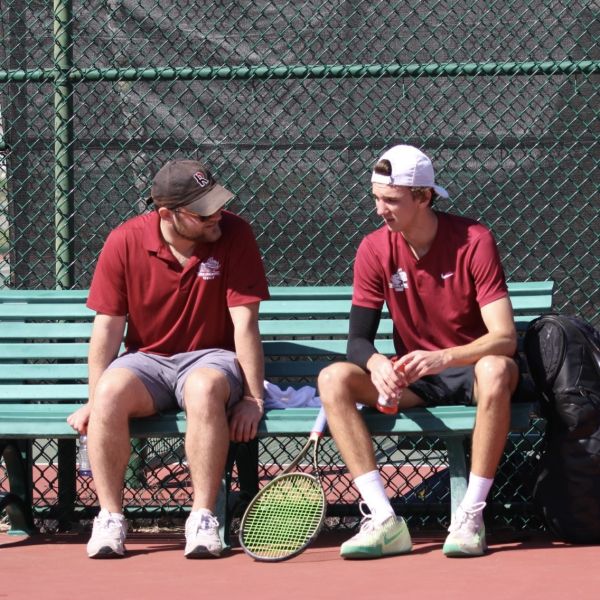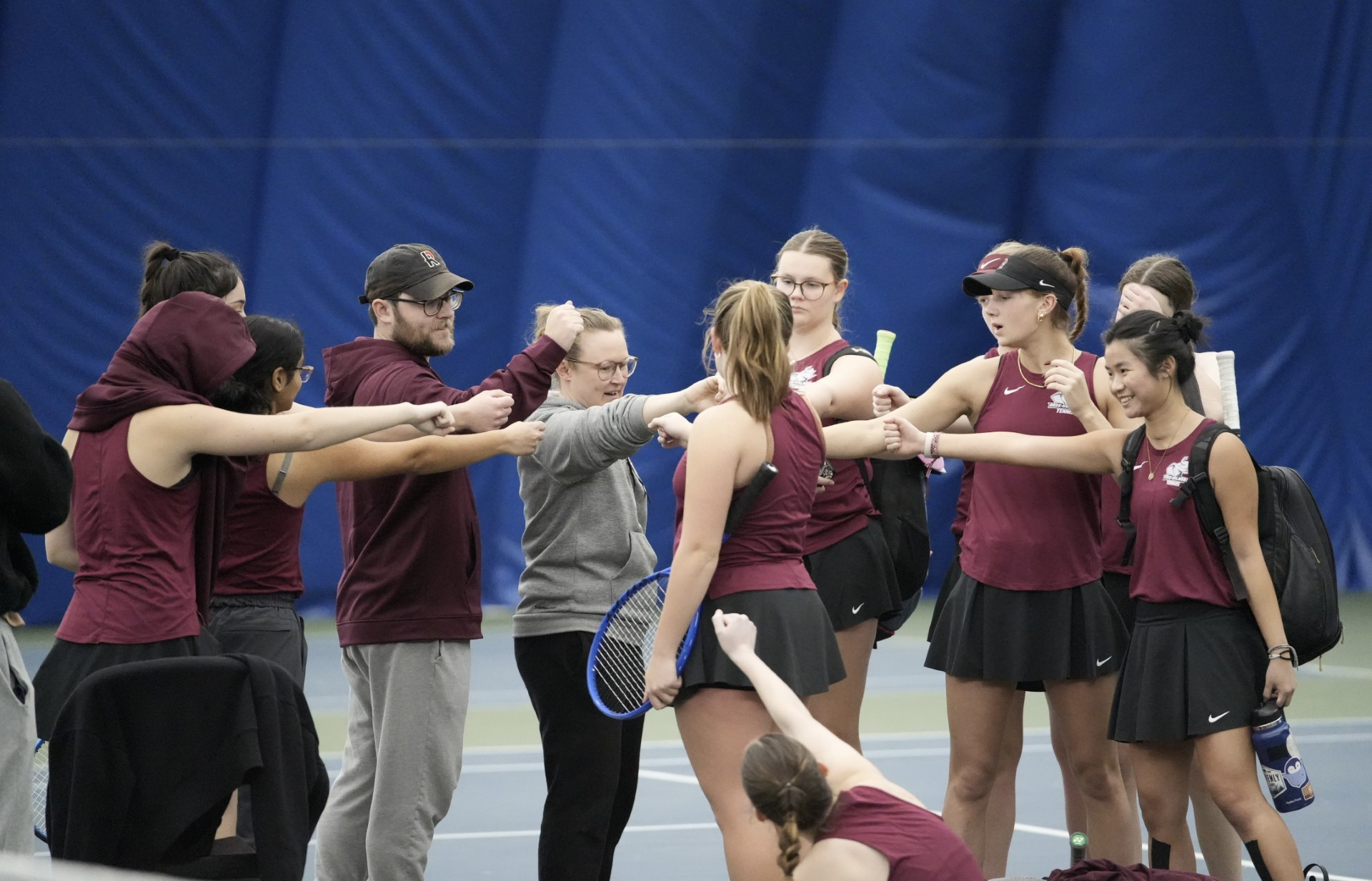
Leading On and Off the Court: Matt Wilson’s Journey from Delta Sigma Phi to NCAA Coaching
Written by
Elizabeth Allouche
Published on
October 2, 2025
Updated on
October 8, 2025
When people ask what Delta Sigma Phi can do for a young man, the answer often looks a lot like Matt Wilson, Indiana State ‘18. A LEAD participant, Bruce J. Loewenberg Leadership Summit graduate, attendee at the 2019 Kansas City Convention, and recipient of a McKee Scholarship, Matt embraced nearly every opportunity Delta Sigma Phi had to offer. As president of the Eta Upsilon chapter at Indiana State, he learned firsthand what it takes to lead with integrity, communicate effectively, and unify a group of strong personalities. Those lessons now define his career as one of the youngest NCAA head coaches in the country.
At just 25 years old, Matt is in his third year as head men’s and women’s tennis coach at Rose-Hulman Institute of Technology, an NCAA Division III institution in Terre Haute, Indiana. He was only 23 when he was hired, making him one of the youngest NCAA head coaches in the country at the time.
Since then, his teams have quickly found success. The men’s program has captured two conference regular-season and tournament championships. The women’s program has finished second in the league two years in a row. Along the way, several players have earned all-conference honors, and two received newcomer of the year awards in the Heartland Collegiate Athletic Conference.
Getting His Start in Delta Sig
Matt grew up in Terre Haute, Indiana, in the shadow of Indiana State University. By the time he arrived on campus in 2018, Delta Sigma Phi’s Eta Upsilon chapter had just been rechartered. Many of his high school friends were already members, and he was drawn to the energy of a group eager to build something lasting.
“I had a lot of friends who joined, and I wanted to join a fraternity,” Matt said. “It was a good time to get involved because the chapter was young and there were so many opportunities to take on leadership.”
He served in various capacities during his time as an undergraduate, including new member educator, director of philanthropy, VP of development, and ultimately president in his senior year. He reflected on the challenges of being chapter president, leading more than 60 members through the challenges of growth and day-to-day operations. “It was a lot of responsibility, but it prepared me for what I do now. I was running meetings, handling budgets, making decisions, and trying to get everyone on the same page,” Matt said.
Coaching by Chance
Coaching tennis wasn’t part of a long-term plan. Matt was only 19 when he started helping out at a local high school, and within weeks, the head coach stepped down.
“I was just supposed to be the assistant,” Matt said. “Two weeks later, I got asked if I wanted to be the head coach. I said yes, and it actually went really well. That’s when I realized I could make coaching work.”
He spent four years coaching at the high school level, building a program at Terre Haute North Vigo HS, while also developing programming and running tournaments for the local community. By the time Rose-Hulman started looking for a new head coach, he had the experience and confidence to take the leap.
.png)
The job at Rose-Hulman came with immediate challenges. On the women’s side, there were only four players on the roster—two short of what it takes to fill out a lineup.
“We barely had enough to play matches,” Matt said. “I had to recruit on campus and put together a team. By the end of that year, we finished second in the conference. That was a big accomplishment for those women and something I’ll always remember.”
On the men’s side, expectations were high from the beginning. “We had a talented group, and we were able to win the conference my first year and then do it again the next year,” he said.
Lessons from Delta Sigma Phi
Matt is quick to credit Delta Sig with shaping how he approaches leadership. Communication, he says, is the most important skill he carried from fraternity life to coaching.
“As chapter president, I had 60 guys to deal with, and everyone had their own ideas,” Matt said. “Now I’ve got 28 athletes. The situations are different, but the idea is the same. If you don’t communicate clearly and honestly, people lose trust. That’s something I learned in the Fraternity, and it’s the same in coaching.”
He also sees parallels between the structure of a fraternity and a team. “Not everyone is in the lineup, but everyone has value. In Delta Sig, not everyone was on exec, but the guys who weren’t still mattered. Tennis is the same way. The players who aren’t in the top six still bring energy, still make the team better. You have to recognize that,” he said.
Being a young coach brought its own hurdles. When Matt took over, some players were only a year or two younger than him.
“Earning respect was the biggest challenge,” he said. “At 23, I had to prove I knew what I was doing. I leaned on my captains, just like I did in Delta Sig. If your leaders buy in, the rest of the group will follow.”

Building Success On and Off the Court
Matt points to that first season with the women’s team as one of his proudest achievements. “Going from four players to finishing second in the conference was special,” he said. “It showed that if you believe in what you’re doing and get the right people on board, you can turn things around quickly.”
The men’s championships stand out, too, but for Matt, it is not just about wins. “Division III tennis is about more than results. There aren’t athletic scholarships for any students. My players are engineers and math/science majors at one of the top engineering schools in the country. Even with their demanding schedules, tennis is their passion, and my job is to help them grow as people and athletes.”
Matt’s goals include continued success for both programs, recruiting strong student-athletes, and raising the profile of Rose-Hulman tennis. Longer term, he is open to athletic administration, a path that would once again draw on the organizational and people skills he first developed in Delta Sigma Phi.
No matter where his career goes, Matt knows the Fraternity has been part of the foundation. “Delta Sig gave me the chance to lead, to make mistakes and learn from them, and to build confidence,” he said. “Those experiences are a big reason why I’m where I am today.”